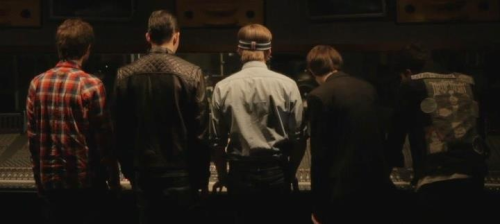Martin Solveig is back with a new episode of SMASH. This time for the track that gives name to his incoming EP, 'The Night Out'. An epic and hilarious chapter from one of the best Djs and producers on earth. A room with A-Track, Porter Robinson, Zedd, Dillon Francis and an invisible Madeon. I bet that more of one will kill for five minutes in that room!
You can order Martin's E.P. "The Night Out" on iTunes
And for those who really are interested about music, here you have a little of history about this mastermind...
...perhaps it is our well-documented mutual antipathy, or maybe it is our well-documented ignorance, but Britain’s perception of French music is plain wrong. On the surface, it is indeed the land that listens to Europap and still loves to jive badly to La Bamba ’ but scratch beneath the surface and you’ll find a wealth of talent gasping for air. It has a long and noble tradition of fine singers, musicians and producers, from y y to Guy Cuevas, from Jacques Dutronc to the Saintly Serge Gainsbourg and Jean-Claude Vannier; from Ze Records to Africanism! and from Cerrone to, yes, Martin Solveig.Martin Solveig has been involved in music since he was knee-high. As a boy, he studied classical music.
 By
age 13 he had acquired his pair of decks and began DJing, although it
wasn’t until 1992 that he discovered electronic music. His schooling
came courtesy of a sales job at the vaunted Parisian record store Champs
Disques on Champs Elyses. Martin’s big break, at the tender age of 18
and thanks to the encouragement and support of mentor Claude Monnet,
came when he landed the residency at prestigious Parisian nightspot Le
Palace. A move to Les Bains Douches, a legendary club in the city, and
then Solveig’s own Pure parties at Queen cemented his growing reputation
as one to watch. But simply being a DJ has never been enough for Martin
Solveig and his production ideas soon began to filter out on to vinyl,
as he always knew they would. If Heart Of Africa, on his own Mixture
label, drew admiring glances, it was his contribution to the Africanism
series (with Bob Sinclar and DJ Gregory), the stunning Edony, which
turned heads. Originally intended purely as a club track, Edony shot to
the top of club charts and from there launched itself into mainstream
arenas. Martin’s debut album, Sur La Terre, was the work of a young man
bursting with ideas, styles, and experiments. Over the next few years
Solveig hit hard with one killer cut after another, abetted by some
frankly brilliant mixes by the likes of Pete Heller and Mousse T.
Rocking Music, with its echoes of Prince and Michael Jackson, was an
instant anthem wherever it was played and transferred from underground
floors to Radio 1 playlists with consummate ease. The follow-up, I’m A
Good Man, voiced by legendary growler Lee Fields, was a plaintive cry
from a wronged man and in Mousse T’s Breakbeat Mix brought a taste of
Noo Orleans funk to modern electronic dancefloors. ‘The new album
probably has a slight flavour of the ’60s and ’70s, which have always
embodied a certain freedom for me, being a child of the 80s, the
economic crisis, the condom generation?!
By
age 13 he had acquired his pair of decks and began DJing, although it
wasn’t until 1992 that he discovered electronic music. His schooling
came courtesy of a sales job at the vaunted Parisian record store Champs
Disques on Champs Elyses. Martin’s big break, at the tender age of 18
and thanks to the encouragement and support of mentor Claude Monnet,
came when he landed the residency at prestigious Parisian nightspot Le
Palace. A move to Les Bains Douches, a legendary club in the city, and
then Solveig’s own Pure parties at Queen cemented his growing reputation
as one to watch. But simply being a DJ has never been enough for Martin
Solveig and his production ideas soon began to filter out on to vinyl,
as he always knew they would. If Heart Of Africa, on his own Mixture
label, drew admiring glances, it was his contribution to the Africanism
series (with Bob Sinclar and DJ Gregory), the stunning Edony, which
turned heads. Originally intended purely as a club track, Edony shot to
the top of club charts and from there launched itself into mainstream
arenas. Martin’s debut album, Sur La Terre, was the work of a young man
bursting with ideas, styles, and experiments. Over the next few years
Solveig hit hard with one killer cut after another, abetted by some
frankly brilliant mixes by the likes of Pete Heller and Mousse T.
Rocking Music, with its echoes of Prince and Michael Jackson, was an
instant anthem wherever it was played and transferred from underground
floors to Radio 1 playlists with consummate ease. The follow-up, I’m A
Good Man, voiced by legendary growler Lee Fields, was a plaintive cry
from a wronged man and in Mousse T’s Breakbeat Mix brought a taste of
Noo Orleans funk to modern electronic dancefloors. ‘The new album
probably has a slight flavour of the ’60s and ’70s, which have always
embodied a certain freedom for me, being a child of the 80s, the
economic crisis, the condom generation?!Then I’m into wine, parties and low necklines, so I feel quite in tune with the title.’ So says Martin of his latest album, Hedonism, which amply showed the maturation of his productions, moving effortlessly from the familiar terrain of four-to-the-floor rhythms, to take in the sub-R&B of Black Voices or the audacious modern reading of Requiem Pour Un Con. ‘Serge Gainsbourg is a master and I wanted to pay humble tribute,’ says Martin. ‘The song provides a little break in the album’s progress, as well as a French touch that I’m attached to. I think the best songs are made to last and be covered. New versions always have something new to add, even if they never achieve the magic of the original.
‘This cover version, defiantly electronic, compared to the sparse and organic original, ably demonstrates the Solveig modus operandi, producing music that is simultaneously synthetic and natural, warm and glacial. ’I use both electronics and live musicians, sometimes with classical instruments like keyboards, horns and any piano instruments,’ explains Solveig. ‘Most of my drums are programmed, but what I really love is using classical instruments with an electronic device. For example I used a big B3 Hammond organ, recorded a whole session with a musician and then took bits from it and made it sound almost like an electronic sample. You still have the good quality of the instrument, but with the ability to make it a bit faster or more repetitive or whatever. That’s what I like ’ to get inside an organic sound and make it electronic.’ Martin Solveig is not prolific, but everything he makes is worth waiting for. He has always eschewed the remix treadmill, not because he disapproves of it, but it is simply not his path. Solveig’s destiny lies elsewhere.
His life is good. Fulfilled. ‘Even if I sometimes grumble a bit from tiredness, I’m a child blessed by fortune and very happy in his everyday life,’ chuckles Martin. ‘I should quote Karl Lagerfeld: ’Holidays are for people who work’.’ And all work and no play would make Martin a very dull boy indeed.


 11:16 PM
11:16 PM
 JFK
JFK





0 comentarios:
Post a Comment